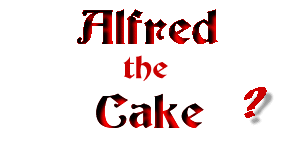

A collection of Alfredian ephemera
One of the best known (although apocryphal) stories of Alfred concerns him "burning the cakes", which has become the most enduring folk image of Alfred. The story tells that when his fortunes were at their lowest ebb Alfred sought refuge in a swineheard's hut. One day, the swineherd's wife asked him to watch over the cakes which she had placed in the oven. Alfred, proccupied with his own problems, neglected the cakes, and allowed them to burn. The earliest written version of the story can be traced back to the late 10th century Life of St Neot, and it is known in many variations since. The first modern edition of Asser's Life of King Alfred, published by the great antiquarian Mathew Parker in 1574, wrongly included the story of the cakes, and this error was followed by subsequent editions up to the early 20th century, thus firmly imprinting the story in the public conciousness.
|
|
© S Dent & E Jobbins |
Sellar and Yeatman's wonderful 1066 and All That is subtitled A memorable History of England, comprising all the parts you can remember, including 103 Good Things, 5 Bad Kings, and 2 Genuine Dates. They take the story of the cakes to heart and devote a chapter to the man they call Alfred the Cake. They proclaimed Alfred to be the first Good King (with the exception of Good King Wenceslas), and pointed out that the cake story could not have been true...
As, however, Alfred could not have been an Incendiary King and a Good King, we may dismiss the story as absurd...
Here are a few more of their gems on the topic of Alfred (not to be confused with Arthur)...
Alfred ought never to be confused with King Arthur, equally memorable but probably non-existent and therefore perhaps less important historically (unless he did exist).
...the Danes invented a law called the Danelaw, which easily proved that since there was nobody else left alive there, all the right-hand part of England belonged to them. The Danish Conquest was, however, undoubtedly a Good Thing, because although it made the Danes top nation for a time it was the cause of Alfred the Cake...
The English resisted the Danes heroically under Alfred, never fighting except against heavy odds, till at the memorable Peace of Wedmore Alfred compelled the Danes, who were now (of course) beaten, to stop being Danes and become English and become C. of E. and get properly married.
It was also in King Arthur's (sic) time that the Anglo-Saxon Chronicle was published: this was the first English newspaper and had all the news about his victories, and Lady Windemere, and the Cakes, etc.
If you would like to learn about Hengist and his wife (? or horse) Horsa, the Venomous Bead (author of The Rosary), the Egg-kings, as well as a variety of other figures from Sellar and Yeatman's alternative view of English history, then this book is recommended reading.
~~~~~~~~~~~~~~~~~~~
This is probably the appropriate page to include some of the more unusual 20th century knick-knacks relating to Alfred the Great. To view the images, click on the link:
My home correspondence is generally opened by way of this letter-opener, in the shape of a sword, but modelled on the Alfred Jewel. Now we know what it was really for!
A rather fine rendering of the Winchester statue in the form of a door knocker. Don't knock it!
A poster advertising King Alfred's Hampshire Bitter, a local Hampshire brand of beer. This is an interesting image, not simply a cod-medieval drawing but based closely on the figure (of St Mathew?) at the beginning of Mathew's Gospel in the Codex Aureus, a richly decorated 8th century Anglo Saxon manuscript of the Gospels.
Just near the statue of Alfred in Wantage is a pub, King Alfred's Head, which includes the nightclub Alfie's Disco. Close up of the Pub sign
[ Celtic Monasticism | Alfred Homepage
| The Bookshop ]
[ Ogdoad's Page ]